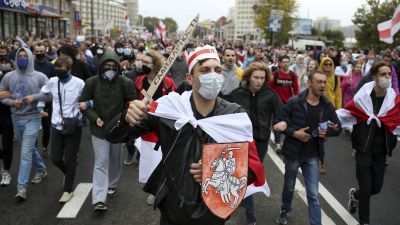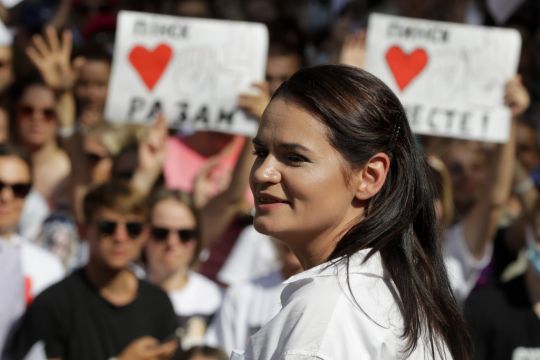The European Union has awarded its top human rights prize to the Belarus opposition movement and its leader, Sviatlana Tsikhanouskaya, for their challenge to President Alexander Lukashenko’s long, hard-line reign.
The 27-nation bloc agreed this month to impose sanctions against officials suspected of election misconduct and a brutal security crackdown on protesters in Belarus.The EU has warned it is ready to sanction Mr Lukashenko himself if he fails to enter into talks with the opposition and order an end to the repression launched after a disputed election.
Mr Lukashenko won his sixth term in office in a presidential election widely seen as rigged.
Since the August 9th polls that handed Mr Lukashenko victory with 80 per cent of the vote, mass protests have rocked the ex-Soviet nation sandwiched between Poland and Russia.
Ms Tsikhanouskaya, his main challenger, got 10 per cent of the vote.

She and her supporters refused to recognise the results, saying the outcome of the vote was manipulated.
“It is an honour to announce that the women and men of the democratic opposition in Belarus are the 2020 Sakharov Prize laureates,” European Parliament president David Sassoli said.
“They have on their side something that brute force can never defeat: the truth.
“Do not give up on your fight. We are by your side.”
A 38-year-old former English teacher with no previous political experience, Ms Tsikhanouskaya joined the race after her husband who aspired to run for president was jailed. He has remained in prison.
She has rejected the official tally and refused to concede defeat but was forced to move to Lithuania under pressure from authorities.
Human rights
Ms Tsikhanouskaya shares the prize with several leading members of the opposition’s Coordination Council, which was created after the election in a bid to facilitate talks on a transition of power.
They include Nobel Laureate Svetlana Alexievich, musician Maryia Kalesnikava and political activists Volha Kavalkova and Veranika Tsapkala and prominent opposition politician Mikola Statkevich, who was recently jailed.
The EU award, named after Soviet dissident Andrei Sakharov, was created in 1988 to honour individuals or groups who defend human rights and fundamental freedoms.
Last year’s winner was economist Ilham Tohti for his work defending China’s Uighur minority.
Others on the shortlist for the award this year were activists defending the Guapinol river in Honduras and murdered environmental activist and indigenous leader Berta Caceres.

Najeeb Michaeel, the archbishop of Mosul, also made the cut for his role in the evacuation of Christians, Syriacs and Chaldeans to Iraqi Kurdistan and safeguarding historic manuscripts after the Islamic State arrived in Mosul in 2014.
Mr Sassoli paid tribute to Arnold Joaquín Morazan Erazo, a member of the environmental group opposing an iron oxide mine in Honduras who was killed this month.
“It is imperative that a credible, independent and immediate investigation is launched into this case and those responsible must be held to account,” he said.
The prize will be presented in a ceremony in Strasbourg, France, on December 16th.







